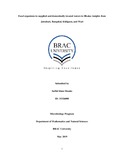Fecal organisms in supplied and domestically treated waters in Dhaka: insights from Jatrabari, Bangshal, Khilgaon, and Wari

View/
Date
2019-05Publisher
Brac UniversityAuthor
Shanto, Saiful IslamMetadata
Show full item recordAbstract
Dhaka, the capital city of Bangladesh, is the most densely populated city of the world. So, it is always a challenge to meet the ever increasing demand for pure drinking water of this huge population. This study aims to detect the presence of fecal coliform (FC) and Salmonella spp. in the supplied and domestically treated waters in Bangshal, Khilgaon, Jatrabari and Wari. A total of 110 samples were collected from October 2018 to April 2019. The average fecal coliform count in raw water for Jatrabari zone was 58.33, for Wari 10.17, for Khilgaon 49.83 and for Bangshal 17.86; in boil water 4.25 for Jatrabari, 0.00 for Wari, 4.38 for Khilgaon, for 0.00 Bangshal; in filtered water 1.74 for Jatrabari, 0.00 for Wari, 1.04 for Khilgaon, for 0.00 Bangshal. PCR-based detection of Salmonella spp. suggests occasional contamination in water samples from Bangshal, Khilgaon, Jatrabari and Wari along with Korail Slum and Tea stalls sample. From this study reveals possibility of transmission of fecal pathogens via drinking water and generates evidence that contaminated drinking water is an overlooked health hazard in Bangshal, Khilgaon, Jatrabari and Wari.
